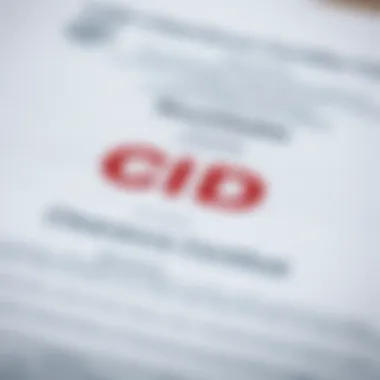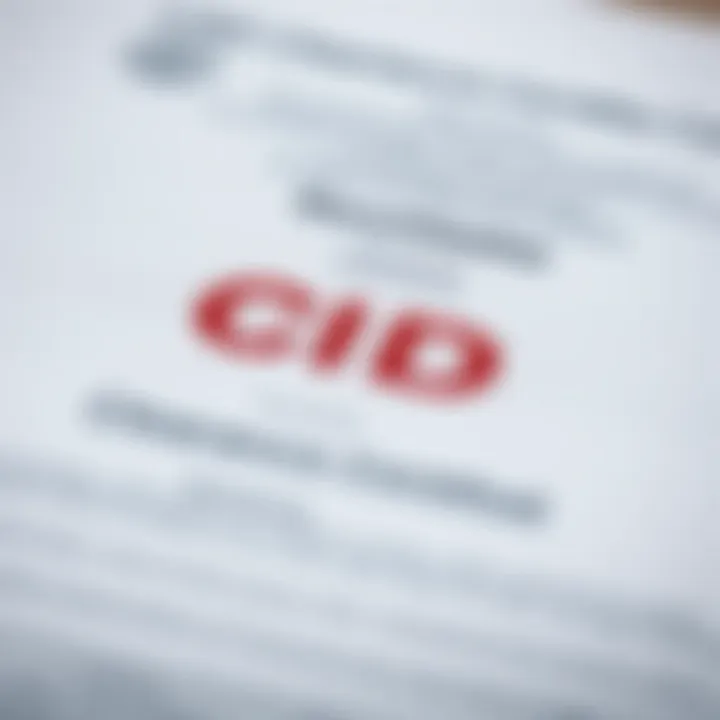Understanding CID Clearance Certificate in the UAE


Intro
In the dynamic landscape of the United Arab Emirates, particularly in Dubai, the importance of a CID clearance certificate cannot be overstated. For both locals and expatriates, this document plays a pivotal role in ensuring smooth financial and legal transactions, especially in the ever-evolving real estate market.
The CID clearance certificate serves as a formal attestation that an individual or a business has no criminal background, a vital prerequisite for many processes including leasing residential or commercial properties. Understanding its significance, along with the application process and requirements, can substantially impact one's journey in the UAE. Not only does it foster a sense of security, but it also enhances the appeal of potential investments.
This article aims to unravel the complexities surrounding the CID clearance certificate, shedding light on its key aspects, especially the barriers faced by expatriates. We'll explore pragmatic insights into how this certificate influences real estate transactions, ensuring that stakeholders—from investors to renters—have a coherent understanding of its relevance in shaping the UAE's property market.
Foreword to Clearance Certificate
The CID Clearance Certificate is a crucial document for anyone wishing to engage in significant financial transactions, particularly in the realm of real estate in the United Arab Emirates. For investors, real estate agents, and expatriates, understanding this certificate's role is paramount. As the UAE continues to attract businesses and individuals from around the globe, the complexities of its legal landscape necessitate a robust grasp of various formalities, not least of which is the CID Clearance.
Definition and Purpose
At its core, a CID Clearance Certificate serves as a formal confirmation from the UAE's Criminal Investigation Department that an individual is free from any criminal records. Its primary purpose is to provide peace of mind to various stakeholders, particularly when establishing trust in business dealings or property investments. The certificate validates that the applicant does not carry any history that might jeopardize their eligibility for certain engagements—be it purchasing property, securing a job, or registering a business.
Importance in the UAE
In a jurisdiction as bustling as the UAE, characterized by a melting pot of cultures and diverse demographics, the CID Clearance Certificate acts as a linchpin for many processes. Here are several key reasons why it holds such importance:
- Trust Building: Having a clean record fosters trust among potential business partners and in property transactions. Without this certificate, lenders may hesitate to extend credit or financiers might be wary of engagement.
- Regulatory Compliance: Many businesses and real estate ventures require applicants to show proof of this clearance for licensing or tenancy agreements. Thus, it becomes a gatekeeper of sorts for various commercial activities.
- Legal Protection: For expatriates, possessing a CID Clearance not only clears the way for residence and employment needs but also protects against any legal snares that could arise from previous indiscretions.
Understanding these nuances enables various stakeholders, from investors to expatriate professionals, to navigate the landscape effectively. As such, the CID Clearance Certificate goes beyond being a mere formality; it is a fundamental component in ensuring smooth and lawful transactions in the UAE, laying down the groundwork for trust and compliance in an often complex environment.
Eligibility Requirements for Clearance
The CID clearance certificate serves as a vital document in the UAE, especially when it comes to various legal transactions such as real estate deals and business operations. Understanding the eligibility requirements for obtaining this certificate is essential for anyone looking to navigate these processes smoothly. Knowing who qualifies for a CID clearance certificate, as well as the distinctions between local and expatriate applicants, can make all the difference in an individual’s or company’s journey in the UAE.
Who Needs a Clearance Certificate?
The CID clearance certificate isn't just a piece of paper; it’s often a prerequisite for numerous activities in the UAE. Individuals and businesses alike might find themselves needing this certificate, which serves as a background check certification issued by the Criminal Investigation Department. Here are some key scenarios in which obtaining a CID clearance certificate is essential:
- Real Estate Transactions: Anyone looking to buy or rent property will require a CID clearance certificate. It proves that the individual has no criminal record, easing the trust-building process between buyers, sellers, and landlords.
- Employment: Many employers in the UAE, especially in sensitive sectors like banking and education, require proof of a clean criminal record before hiring. A CID clearance certificate is often a part of the hiring process.
- Visa Applications: Expatriates applying for residency visas need to present this certificate to prove they are law-abiding citizens, which helps in streamlining their approval process.
- Business Licensing: When starting a new business or renewing licenses, the authorities may require this clearance as part of the regulatory checks.
Distinctions Between Local and Expatriate Applicants
Understanding the distinctions between local and expatriate applicants for the CID clearance certificate is vital, as it can influence the application process and requirements.
- Local Applicants: Citizens of the UAE generally face a straightforward application process. They are typically required to provide a national ID and complete the necessary forms, often finding the procedures to be familiar and less cumbersome. They may have quicker access to local resources that help in expediting their applications.
- Expatriate Applicants: Expatriates, on the other hand, may encounter additional steps. They usually need to submit a residency visa along with identification documents. In some instances, they may also need to provide proof of employment or sponsorship to demonstrate ties within the UAE. Moreover, the processing time for expatriates might vary significantly, influenced by their home countries and other factors.


Remember, preparation is key; having the right documents on hand will make the application process a breeze.
Application Process
The application process for a CID clearance certificate is a vital aspect to grasp, especially for those navigating the regulatory landscape in the UAE. This certificate is not just a bureaucratic hurdle; it's a critical document for ensuring transparency and trust in various transactions—from property purchases to business dealings. Understanding the procedure can save individuals time and potentially costly errors.
Step-by-Step Guide to Applying
Applying for a CID clearance certificate can seem like a daunting task at first glance. But, if you break it down step-by-step, it becomes much more manageable. Here's how you can go about it:
- Gather Required Documents: This is the first step and arguably one of the most crucial. Without the correct documents, your application may be delayed.
- Fill Out the Application Form: You can typically find this form on the official government web portal or at a relevant government agency. It’s straightforward—just ensure every section is filled out accurately.
- Submit Your Application: You can submit the application online or in person at designated offices.
- Pay the Fees: Once your application is submitted, there will be a fee you’ll need to pay. Keep a receipt as it's crucial for tracking your application.
- Await Processing: Now comes the waiting game. Processing times can vary, so it's wise to keep your lines of communication open with the authorities.
- Receive Your Certificate: Upon approval, you’ll receive your CID clearance certificate. Verify its accuracy before proceeding with further transactions.
Required Documents for Application
When applying for a CID clearance certificate, certain documents are non-negotiable. Having these at your fingertips not only expedites the process but also minimizes the risk of hiccups. Here’s a comprehensive list to consider:
- Valid Passport Copy: This serves as your primary identification.
- Residence Visa Copy: Required for both expatriates and locals.
- Photographs: Generally, two recent passport-sized pictures are sufficient.
- No Objection Letter (if applicable): This is particularly important for expatriates requesting clearance on behalf of their employers.
- Employment Contract: Sometimes required for verification of employment status.
It's wise to double-check the latest requirements from local authorities, as they can change from time to time.
Processing Time and Fees
Understanding the processing time and fees associated with obtaining a CID clearance certificate can help you prepare better. Typically, applicants can expect:
- Processing Time: In most cases, the processing lasts between 3 to 10 working days. This varies based on the volume of applications the authorities are handling at that moment. Therefore, patience is crucial.
- Fees: The application fees can fluctuate depending on the emirate you’re applying in. On average, it can range anywhere from AED 100 to AED 300. Again, it’s best to confirm the fees on the official website or by consulting directly with the authorities.
"The CID clearance certificate isn't merely a stamp of approval; it's a gateway for seamless transactions across the UAE, positioning you as a reliable stakeholder in real estate and business environments."
Grasping these details gives applicants the upper hand, ensuring they are well-prepared to take on the application process with confidence.
Challenges During Application
Navigating the application process for a CID clearance certificate can feel like running a gauntlet of hurdles for many individuals, especially expatriates. The importance of understanding these challenges extends beyond merely collecting papers; it’s essential for ensuring compliance with the regulations in the UAE which likes to keep things straightforward but can sometimes seem about as clear as mud.
Common Issues Faced by Applicants
Many applicants find themselves bogged down by several common issues when filing for a CID clearance certificate. Some of the more frequent problems include:
- Incomplete Documentation: One of the primary reasons applicants face delays is failing to submit all required paperwork. Missing a document can stall the process and lead to added frustration.
- Misunderstandings About Eligibility: Especially for expatriates, difficulties often arise from misconceptions about who is eligible for a CID clearance certificate. This confusion can lead to wasted time and effort.
- Language Barriers: For those not fluent in Arabic or English, interpreting forms and instructions can be daunting. Miscommunication or misinterpretation can have legal consequences.
- Long Waiting Periods: The processing times can sometimes stretch out longer than expected. Applicants may be left in limbo, unable to finalize their property deals or job offers.
All of these issues highlight the importance of preparation and awareness in the application process, ensuring a smoother experience.


Strategies to Overcome Challenges
Understanding the potential issues in advance paves the way for more effective strategies. Here are a few handy tips that can assist applicants in overcoming these challenges:
- Prepare Thoroughly: Before starting the application, cross-reference the checklist of required documents. Ensure that everything is in order to avoid needless delays.
- Seek Clarification on Eligibility: It pays to do your homework and understand the qualifications for applying. Consider reaching out to relevant authorities or legal advisors who specialize in this area.
- Utilize Language Assistance Services: For those grappling with language difficulties, leveraging translation services or asking bilingual friends for assistance can make a big difference.
- Stay Informed About Processing Times: Monitoring the status of your application can give you insight into its current standing, allowing you to plan accordingly. Sometimes, a polite inquiry can push your application through the pipeline more quickly.
By being proactive and approaching the process with a solid strategy, applicants can effectively navigate the stormy seas of CID clearance applications.
Impact on Real Estate Transactions
Understanding the impact of a CID clearance certificate in the context of real estate transactions is crucial. This document serves as a transparent shield, ensuring that both buyers and sellers are engaging in legitimate dealings. The clarity it provides fosters trust, a key currency in any marketplace.
Role in Property Purchase and Leasing
The CID clearance certificate plays a pivotal role during the property acquisition or leasing process. When an expatriate or investor is considering a purchase, having this certificate indicates that they have been vetted by the relevant authorities. It signals that the applicant does not have any criminal background that might complicate the transaction.
In practice, sellers and landlords often require this document as part of their due diligence. For investors, it is not just about buying property but ensuring that it is free from any legal encumbrances. If potential buyers show up without one, it raises a red flag. Some may find themselves politely shown the door or worse, facing scrutiny from authorities.
When it comes to leasing, landlords can face severe repercussions if they lease property to individuals without the necessary clearance. For instance, if a tenant defaults on payments or engages in illegal activities, the landlord can find themselves involved in lengthy legal battles, which may include eviction processes or fines. Thus, ensuring that prospective tenants possess a valid CID clearance certificate protects landlords from future headaches.
Consequences of Not Having a Clearance Certificate
The absence of a CID clearance certificate can lead to significant complications for individuals engaged in real estate transactions. Firstly, prospective buyers or renters might find themselves facing severe limitations when looking for properties. Many landlords or sellers prioritize certified tenants or buyers, which effectively blocks those without such a certificate from participating in lucrative real estate opportunities.
Moreover, without this vital document, buyers can expose themselves to legal repercussions, particularly if any issues emerge post-transaction. Imagine purchasing a property only to find out later that previous dealings were unlawful, or that the former owner had unresolved legal disputes. Those surprises could lead to loss of investment, financial damages, or even criminal liabilities, depending on the situation.
To succinctly put it, not having a CID clearance certificate can put a damper on property ambitions, leading to missed opportunities and potential legal nightmares.
In the bustling real estate market of the UAE, where the competition is fierce, the absence of this clearance undoubtedly shifts the odds against any applicant seeking to make their mark in the industry.
"Navigating the UAE's real estate landscape without proper documentation is akin to sailing in uncharted waters; it may look inviting at first, but hidden hazards abound."
By ensuring that both buyers and renters have the required CID clearance, the government reflects its commitment to maintaining a safe and secure environment for all participants in the real estate market. Thus, fortifying the link between documentation and security in UAE’s vibrant property sector.
Importance for Businesses
The CID clearance certificate is more than a mere document in the realm of business operations in the UAE. It acts as a gatekeeper, signaling trustworthiness and reliability to partners, clients, and regulatory authorities alike. In a bustling business hub like the UAE, where competition thrives, obtaining this certificate can be a decisive factor in a company’s operational success.
How the Clearance Certificate Affects Business Operations
The impact of having a CID clearance certificate is profound. It validates a business’s credibility and offers peace of mind to stakeholders. When partners see that a business has undergone the necessary checks, including background verification of its key individuals, they are more likely to engage in contracts, collaborations, and other forms of business dealings.


For example, a cleaning company looking to secure a contract with a large real estate firm will need to prove it operates within legal confines and isn’t mired in any criminal activities. The CID clearance acts as a stamp of approval that clears the air of any doubts. On the other hand, businesses lacking this certificate may find doors slammed in their faces. Several companies have reported losing potential partnerships simply because they could not furnish their CID clearance during negotiations.
"In the landscape of business, trust is currency. CID certificates provide that trust, translating to opportunities."
Moreover, having the clearance facilitates smoother business operations. Regulatory bodies often require proof of the certificate during inspections, audits, or other compliance measures. Thus, businesses that hold a CID clearance find it easier to navigate the regulatory maze of the UAE. It allows them to focus on growth rather than worrying about compliance pitfalls.
Relevance in Licensing and Regulatory Compliance
In the UAE, adherence to regulations is paramount for any business looking to thrive in its competitive environment. The CID clearance certificate holds significant weight when it comes to licensing. Many trade licenses require proof of this clearance as part of the application or renewal process.
This relevance cannot be underestimated. For instance, restaurants must procure health and food safety licenses, often necessitating proof of the CID clearance to ensure that the business operators do not have a history of infractions that could jeopardize public safety. Without the clearance, businesses may face delays or outright rejections of license applications. Businesses looking to expand their operations into new areas will find the CID clearance certificate essential in minimizing bureaucratic frenzy while developing goodwill with local authorities.
In summary, the CID clearance certificate stands as a cornerstone for business operations in the UAE. Its significance stretches beyond regulatory compliance, playing a fundamental role in fostering trust and reliability—the very essence of successful business dealings.
Understanding Legal Implications
The legal aspects surrounding the CID clearance certificate in the UAE are quite crucial. They govern not just the application process, but also the implications that this document carries for individuals and businesses alike. Ignorance of these legalities can lead to serious setbacks, including financial losses or tarnishing one's reputation. Hence, having a solid grasp of the legal framework is essential for anyone looking to navigate this aspect of life in the UAE.
Legal Framework Governing Clearance Certificates
The legal structure regulating CID clearance certificates involves multiple laws and decrees from the UAE government. Primarily, these laws ensure that the process maintains a standard that protects both personal freedoms and communal safety. The main body that oversees the issuance of these certificates is the Ministry of Interior, alongside specific divisions within the police departments of various emirates.
For expatriates and citizens alike, the request for a CID clearance certificate serves several purposes—from securing employment to facilitating real estate transactions. The framework requires thorough checks against criminal records and any possible misconduct that could pose risks to society. For instance, a business looking to establish operations in the UAE will typically need a CID clearance as part of the licensing process, as it assures the authorities and stakeholders of integrity in operations. Typically, the processes involved are outlined in several laws, one being the Federal Law No. 31 of 2006 concerning the issuance of identity cards.
Consequences of Misrepresentation
Misrepresentation in the context of CID clearance can have significant repercussions. Misleading authorities, whether intentionally or through negligence, could result in severe penalties. Those consequences can range from denial of the application to possible legal action, instituting a criminal case against the applicant.
It's a hard lesson learned by many who might underestimate the authority's vigilance regarding these matters. Consider a situation where someone provides false information on their application form to cover past legal issues. If discovered, not only will that individual's application be denied, but they might also face restrictions on future applications. In extreme instances, there could be deportation for expatriates or a permanent record that could negatively impact future employment opportunities.
"Proper representation isn’t just about telling the truth; it’s about understanding the weight of compliance in the UAE. A clean record means a smoother path for applicants."
Thus, honesty in the completion of application forms and interactions with officials cannot be overstated. It's essential to be upfront about any past issues, as the CID clearance aims to foster trust within society. When obtaining this certificate, individuals and organizations should realize that maintaining transparency ultimately benefits all parties involved. This approach enhances not only one's prospects but also contributes to the broader business and community environment in the UAE.
The End
The conclusion of this article wraps up the comprehensive examination of the CID clearance certificate in the UAE. It highlights the crucial role that this document plays not only for expatriates and residents but also for investors and businesses navigating the complexities of Dubai’s real estate landscape.
Recap of Key Points
Throughout the article, we explored various dimensions of the CID clearance certificate:
- Definition and necessity: Understanding what a CID clearance certificate is and why it is required.
- Eligibility requirements: Identifying who needs this certificate and the nuances between local and expatriate applicants.
- Application process: A thorough breakdown of the steps to obtain the certificate, documentation needed, and insights on fees and timelines.
- Challenges: Common issues applicants may face in securing the certificate and effective strategies to navigate these hurdles.
- Impact on real estate transactions: Examining how this certificate influences property purchases and leasing arrangements.
- Business implications: Understanding its relevance in operations, licensing, and regulatory compliance.
- Legal ramifications: Discussing the importance of adhering to guidelines to avoid complications stemming from misrepresentation.
Final Thoughts on Clearance in the UAE
Ultimately, the CID clearance certificate functions as a fundamental element in ensuring a smooth experience for anyone looking to engage with the UAE’s real estate sector. It acts as a stamp of integrity, reflecting not just the status of the applicant, but also fortifying the broader framework of business ethics and trust in the marketplace. For investors, a CID clearance serves as a safety net, while for expatriates, it is a gateway into various aspects of life in the UAE.



